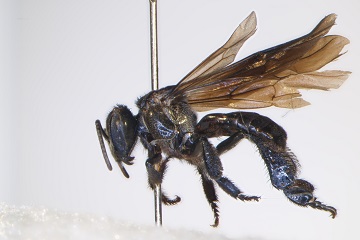Doctoral Student of IPB discovers Bee Propolis without Sting as Complementary Anti Tuberculosis Drugs

Indonesia is one of the countries with the highest susceptibility of Tuberculosis (TB). Indonesia has a high prevalence of TB and is ranked number 2 of the 30 countries with the highest TB burdens. For that, Mahani, a doctoral student of IPB conducts research on the potential of Bee Propolis Without Sting which can be a complement to Anti TB (OAT) to accelerate the process of healing and restoring nutritional status.
Mahani stated that one of the consequential problems in handling TB disease is in the use of OAT which is hepatotoxic. Its side effects are including decreased appetite, nausea, dizziness, insomnia, fever, and weight loss resulting in the decreased nutritional status of the patient. Whereas a good nutritional status can significantly support the healing process of the disease.
Although its effectiveness in killing Mycobacterium tuberculosis (M.tbc) is still lower than OAT, Propolis still has a number of advantages, such as very low potential resistance, more patient-friendly, and may not cause other side effects. Furthermore, it has hepatoprotective and immunomodulatory properties.
Indonesia is a confirmation of its potential of propolis production. Its diversity of inter-provincial is influenced by different species of bees and vegetation of resin sources.
The results of examination of the active compound of Bee Propolis Without Sting from ten provinces in Indonesia showed that the composition of the active compound of each sample of propolis is different from each other. The difference in the composition of the active compound is due to the differences in species of bees and the origin of plants resin.
The antimycobacterial compound of Bee Propolis Without Sting spread in 8 provinces, antibiotics spread in all provinces, hepatoprotector spread over 5 provinces and antioxidants spread over 7 provinces. The mapping of active compounds along with their biological activities shows that 3 provinces in Indonesia (East Kalimantan, South Kalimantan, and South Sulawesi) have a potential propolis to accelerate the healing and recovery process of nutritional status of pulmonary tuberculosis patients.
Prof. Dr. Ir. Ahmad Sulaeman-chairman of the Advisory Commission as well as one of the examiners-conveys that propolis is expected to restore appetite, decreased diarrhea, nausea and vomiting, fever, dizziness, and headaches, as well as increasing the body weight, so the nutritional status will be increased. This acceleration is hoped to heal and recover the nutritional status of the patient with pulmonary tuberculosis. Besides, the propolis sustenance on OAT in pulmonary tuberculosis patients is effective against the M.tbc and can limit its toxic effects.
Propolis as a complement of OAT effectively accelerates the process of healing and restoring the nutritional status of patients with pulmonary tuberculosis. There are active compounds that play a role in accelerating the process of healing and restoring the nutritional status of people with pulmonary tuberculosis. Those active compounds are antimycobacterial, antibiotics, hepatoprotector, and antioxidants. Three provinces in Indonesia which has a potential propolis to accelerate the healing and recovery process of nutritional status of pulmonary tuberculosis patients are East Kalimantan, South Kalimantan, and South Sulawesi.
A total of 50 TB patients were included in the controlled clinical trial. This study has obtained ethical approval from Health Research Ethics Commission, Faculty of Medicine, University of Indonesia number: 1036 / UN2.F1 / ETIK / 2015. Subjects were recruited from all community health center (Puskesmas) in Bogor City.
The results of clinical trials of propolis supplementation in OAT showed that the group receiving 30% of propolis supplementation showed a cure response and improved nutritional status, and healthier liver.
The process of killing M.tbc. requires radical metabolites in large quantities. The body responds by mobilizing the SGOT so that the process of killing M.tbc. remain effective without causing hepatotoxicity.
This dissertation research is funded by the International Cooperation Grant for an International Publication chaired by Prof. Dr. Ir. Ahmad Sulaeman MS, cooperated with Kassel University at Witzenhausen, Germany. (FLW)



